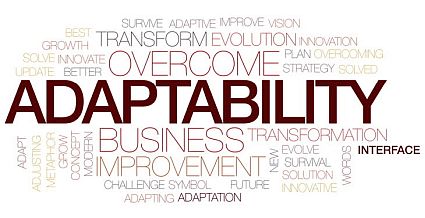Tamara Schenk and I have monthly conversations on all sorts of things. Today, while our agenda didn’t start with this, it ended up being the focus of our conversation. It’s the importance of “Adaptive Fluency.”
To use street venacular, it’s rolling with the punches, yet still achieving your goals.
Sadly, so much of the direction we seem to be going, in sales, marketing, leadership, seems to be taking us away from being adaptively fluent. We are so committed to “scripting” all of our interactions with others. While we have tools and AI to help us refine the scripting, better targeting our scripts to the groups we seek to engage, this scripting reduces our capability to adapt in the real conversation.
We know from watching actors, scripts only work, if each person involved is reading from the same script. But our conversations are a disaster if we are reading from different scripts, or if all parties don’t have the same script or objectives.
Virtually every prospecting conversation inflicted on me is a scripted discussion. It focuses on what the seller wants to say and achieve, not what the victim, I mean prospect seeks to achieve. We can prepare the seller to deal with questions/objections…..”If they ask this, respond with that, or for this, try that….” But, the prospect doesn’t know those are the only permissible questions, inevitably asking something that’s relevant, but is not covered by the script the seller has. And, as a result, we fail to achieve our objectives. More importantly, our prospects and customers aren’t achieving their objectives in those conversations, consequently, they look for their answers in other places.
Selling conversations, coaching conversations, any project or problem solving conversations cannot be scripted conversations. They are collaborative conversations.
Let me be clear, none of these are aimless, unstructured, or random conversations. They are purposeful, focused, interchanges with shared goals. They require active engagement, deep listening, being present, and the adaptive fluency—the ability to adapt to what is happening in the conversation, yet not lose your purpose or goal.
This requires deeper understanding of the customer—not only their business, but them as human beings. It requires active listening/engagement, curiosity, empathy, among other skills. All the elements of collaborative conversations.
It requires us to adapt in the moment, not be stuck in our scripts. But we see great sellers and great leaders doing this all the time–that is what makes them great. It is never their ability to read from a script.
Yet, are we preparing our people to do these things? Are we training them in business/financial acumen? Are we developing their skills in conducting collaborative conversations? Are we leveraging the lessons from “improv” to help them adapt in constructive ways? Are we developing their skills, as leaders, to be more purposeful conducting ad hoc conversations.
We know life and business can never be scripted, yet why do we consistently behave as though they can be? Why not change our approach and improve our ability to adapt to what is happening in each interaction?

Leave a Reply